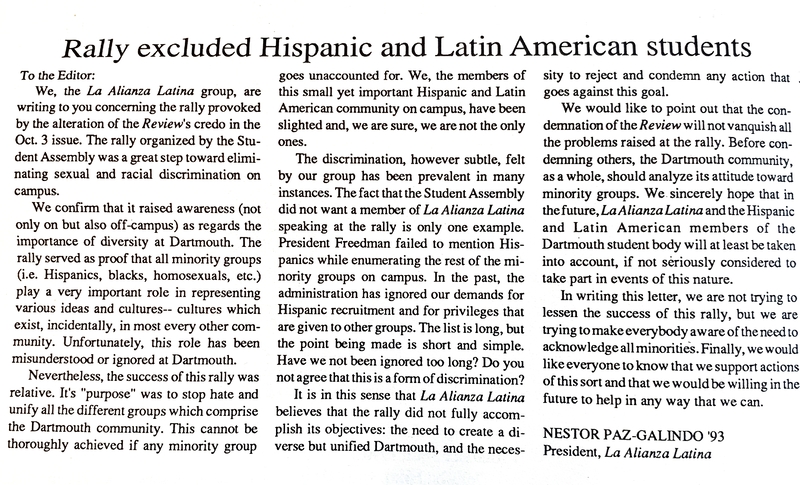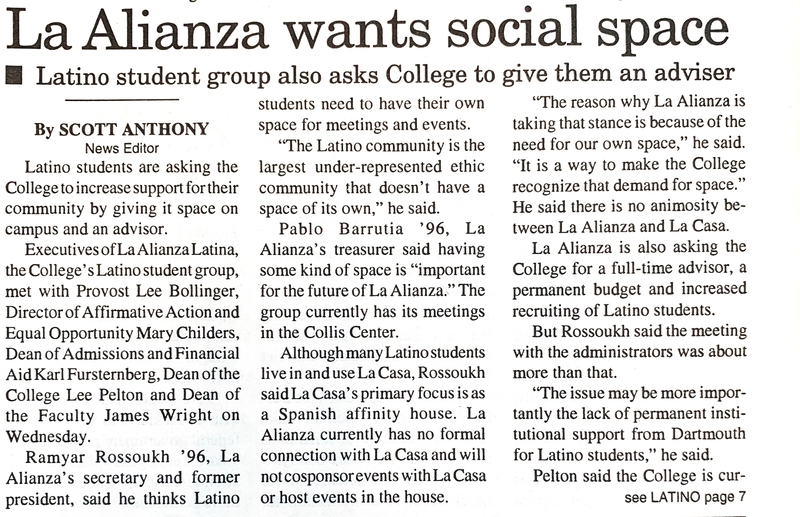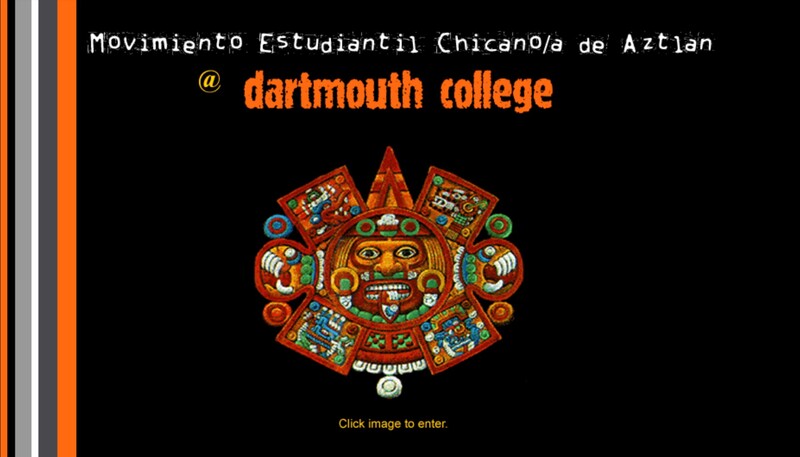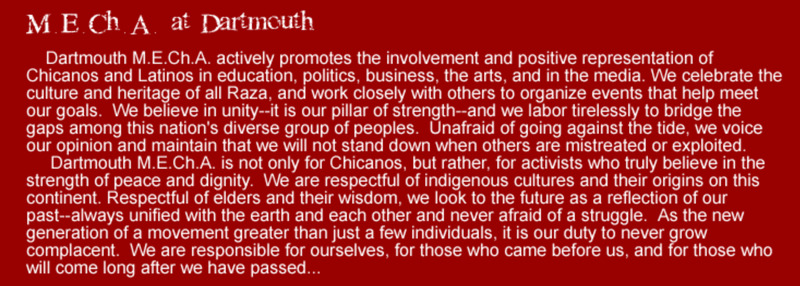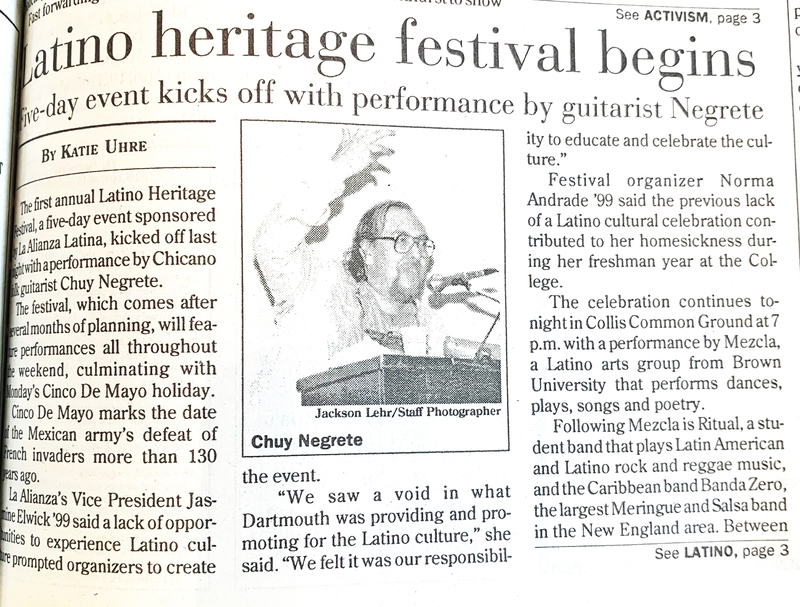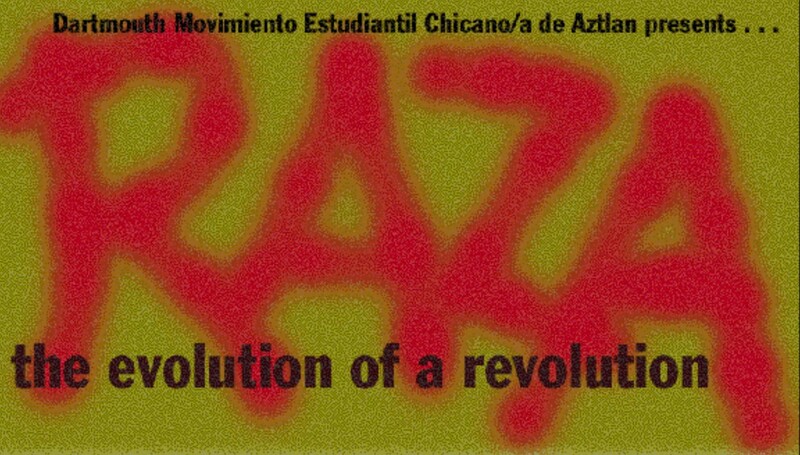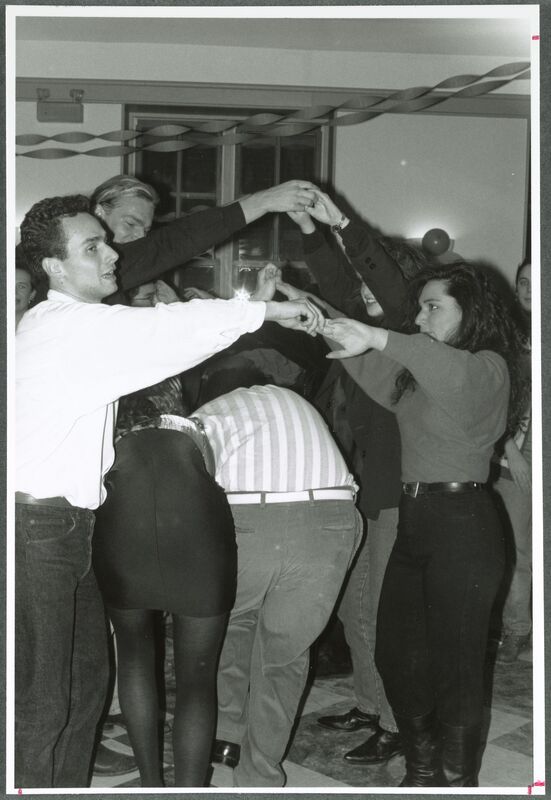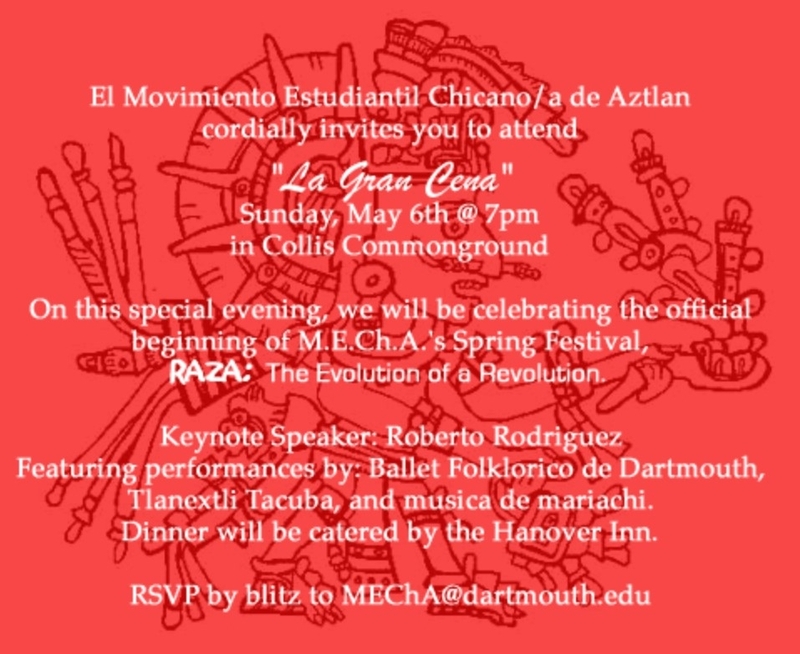La Alianza Latina and M.E.Ch.A.
Byron Francis '24
Welcome to my exhibit for LATS 003: Introduction to Latino Studies.
The goal of this exhibit is to explore Latino student activism at Dartmouth College and beyond. We look at two monumental, student-led organizations that served as pillars of the Latinx college community; Movimiento Estudiantil Chicano de Aztlán (MEChA) and La Alianza Latina. These organizations led the campaign for a space dedicated to Latinos and the expansion of the Latino Studies program. They brought to light the issues Latino/a students faced attending. Though they slightly differ, both organizations fought for better representation of Latino/a students, staff, and faculty. They advocated for the expansion of The Latino Studies Program here at Dartmouth. They also hosted cultural events to invoke pride and historical acknowledgment.
Dartmouth’s MEChA chapter hosted the 2000 Winter East Coast Chicano Student Forum (ECCSF) “Expanding Fronteras: Bridging Communities in Action” alongside the college’s Latino 2000 Conference. The conference consists of many workshops and panelist speakers discussing the state of Latinos in academics, culture, and politics. Latino students from other institutions such as Georgetown and other Ivy institutions. They also went on to host another ECCSF Conference in the Fall of 2001.
La Alianza Latina
Founded in 1985, La Alianza Latina was one of the first student organizations dedicated to Latino/a students. La Alianza is a Pan-Latin American organization dedicated to serving all Latino/a and Hispanic students on campus. Furthermore, they are the umbrella organization for many other Latin American organizations and groups. One organization under their umbrella is Nuestra Voces, a performance group. La Alianza hosted various events, from study sessions to movie nights and parties. They also host guest speakers and networking events.
“Have we not been ignored too long? Do you not agree that this is a form of discrimination?”
- Nestor Paz-Galindo
La Alianza Latina has served as the voice of the Hispanic community in Dartmouth since its formation. On various occasions, they have spoken out against the marginalization and discrimination felt by Latino/a students across the campus. In 1990, during a rally against The Review, members of La Alianza were asked not to speak by the Student Assembly. Many Latinos left the rally unsatisfied and felt their voices were silenced. The then-President, Nestor Paz-Galindo (93’), wrote a formal complaint to the editor of the Dartmouth. He praises and acknowledges the rally for its success and showcasing of unity. However, he notes that it’s not enough to condemn The Review while the Latino community still faces discrimination and exclusion. He mentions lists a few instances of subtle discrimination. One such is when the President of the College didn’t acknowledge Latino students speaking to minority groups on campus. Though it can be rubbed off as an innocent mistake, the incident further emphasizes the invisibility of the Latin American community.
La Alianza is also significant in the fight to create the Latin American, Latino, And Caribbean Studies (LALACS) living-learning community (LLC). The group wanted a home specifically for the Latino community on campus. The then President of La Alianza, Ramyar Rossoukh, claimed, “The Latino community is the largest under-represented ethnic community that doesn’t have a space of its own.” At the time, African American students had the Cutter-Shabazz building, and Native American students had the Native American House. Though many students lived in La Casa, it was simply an LLC for Spanish speakers. The group actively did not cosponsor events with La Casa nor acknowledge a connection with the space. They also stated that there was never anything wrong with La Casa, but their lack of connection to it brought light to the desperate need for their own house. They argue that the house is simply a Spanish Affinity and that they needed a space specifically for Latino/a students. They also demanded an advisor specifically for Latino students.
With multiple instances of discrimination, ignoring their concerns, and exclusion during events, it was apparent to them that Dartmouth did not want to support the Latino community. The attitude of the college merely confirmed and validated the need for the organization.
Movimiento Estudiantil Chicano de Aztlán
In his work “Youth, Identity, Power: The Chicano Movement,” Carlos Munoz explains the history behind the expansion of Chicano Studies. He touches on the hardships Mexican Americans faced in higher education. Before the Chicano Movement and Chicano student activism in the 60s, Mexican Americans were a rarity in college; the majority came from middle-class families. Upon entering college, they found themselves lost and voiceless. Their needs were largely ignored, and their entire history was omitted from textbooks and the college curriculums. Many Latinos pointed toward the Civil rights movement as beneficial but mostly towards only African Americans. Mexican Americans began to organize for educational equity after the Civil Rights era ended in the late 60s. Mass protests began to break out all over California. After a Los Angeles high school rally, the Chicano Coordinating Committee on Higher Education was formed. This committee would be the precursor for Movimiento Estudiantil Chicano de Aztlán, or MEChA.
MEChA is a national organization for Chicano/a students founded in 1969,. The organization’s birth is credited to two mass student protests in particular. The first occurred in Denver, Colorado, and drew a crowd of over a thousand. There, El Plan de Espiritual de Aztlán was created. At another conference held at the University of California in Santa Barbara, a larger audience appeared and formed El Plan de Santa Barbara. These two documents would create the constitution and foundation for Movimiento Estudiantil Chicano de Aztlán, or MEChA. The organization aims to fight for educational, political, and cultural empowerment amongst Chicano/a students. They advocate for more resources for college students, cultural recognition, and acknowledgment. Based on records, Dartmouth’s MEChA branch formed in the late ’90s. Their goals, outside of those laid out by the national movement, are to advocate for a more expansive Latino Studies Program at the College and improve recruitment for Latino/Chicano students and faculty.
Dartmouth’s MEChA chapter hosted the 2000 Winter East Coast Chicano Student Forum (ECCSF) “Expanding Fronteras: Bridging Communities in Action” alongside the college’s Latino 2000 Conference. The conference consists of many workshops and panelist speakers discussing the state of Latinos in academics, culture, and politics. Latino students from other institutions such as Georgetown and other Ivy institutions. They also went on to host another ECCSF Conference in the Fall of 2001.
Conclusion
Both organizations shared a goal of improving the Latino Study program at Dartmouth. They also want to provide resources to better help and serve their communities. Resources include things such as a safe space specifically for them, faculty, and staff that are of the same community.
While the organizations share some goals, we must note their differences. One mentioned earlier is that MEChA is specifically for Chicano/a-identifying students, whereas La Alianza is for all Hispanic and Latino/a students. The difference in demographics is essential because while their audience may all be Latino/a, there are still cultural and group differences within the community. Much more, each of these groups may have different struggles that the others may not face. But a difference is that MEChA is a more established and recognized organization, as it’s a national one. Also, MEChA has a strong political element within the organization’s core to improve political thought and involvement.
Neither organization is still active at Dartmouth College, and it is unclear when either disappeared. While there are records of some of the events these organizations did, there’s no complete picture. It is hard to accurately determine the full complexity of both organizations and what they’ve done throughout their short time on campus.

